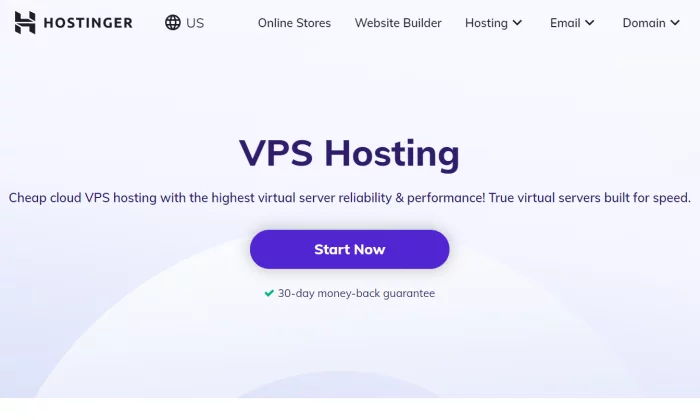
Disclosure: This content is reader-supported, which means if you click on some of our links that we may earn a commission.
Do you want to skip the read and get right to my top picks? The best VPS hosting services for most people are Hostinger or Bluehost.
Upgrading to one of the best VPS hosting plans will drastically improve your site performance if you’re currently using shared hosting.
VPS stands for virtual private server. It means you get a private slice of server resources–no more sharing them with other websites–and the ability to customize the server, which you can’t do with shared hosting.
You get the exact resources your sites need, but you don’t have to pay hundreds of dollars a month for an entire dedicated server of your own.
Or, maybe you need VPS for a different reason, such as corralling all the data from a fleet of smart devices or vehicles, running gaming servers, or computing ungodly amounts of data.
Don’t worry, I’ve got you covered. Using VPS servers for edge computing offers a far more efficient way to get data to the end-user than sending everything through a single central server.
Let’s run through everything you need to know to make an informed decision. I’ll start off with in-depth reviews of my top recommendations for VPS hosting and conclude with a brief buyer’s guide to help you select the best fit for you.
#1 – Hostinger — The Best VPS Hosting for First-Timers

Hostinger has some really inexpensive VPS plans and an approachable interface that makes it perfect for new users.
You won’t get as much assistance setting things up as you do with a fully-managed plan, but it’s a fraction of the cost.
It’s not like you don’t get support. Far from it. Hostinger has customer service agents available. 24/7/365. The company promises short wait times for answers whenever you reach out, even though it’s an unmanaged plan.
And compared to some of the unmanaged plans aimed solely at developers, Hostinger is a lot more welcoming. You’re not expected to know everything, and helpful context is always linked or a click away.
Consider how easy it is to backup and restore your VPS server. Weekly or daily backups are generated automatically, depending on your plan, and available in your control panel.
You can also create a snapshot of the VPS at that exact moment whenever you want. This is great if you are about to try a major change on your site. Something goes wrong, just restore your site to the way it was before in a couple clicks. No harm, no foul.
You get a solid range of OS choices: CentOS, Ubuntu, Fedora, Debian, or Suse. These are one-click to install.
Hostinger describes its plan structure as “semi-managed” VPS hosting. It’s good for starting out because you get a mix of support and freedom at a really low cost.
Hostinger doesn’t include licenses cPanel with the budget VPS hosting plans. There’s just no way they can give it away when you are only paying a few bucks a month for VPS hosting. The good news is that it’s cheaper to get cPanel with Hostinger than it is with any other host, starting at $1.95 per month.
Hostinger has six levels with increasing amounts of server firepower. VPS levels 1-4 are shown below:
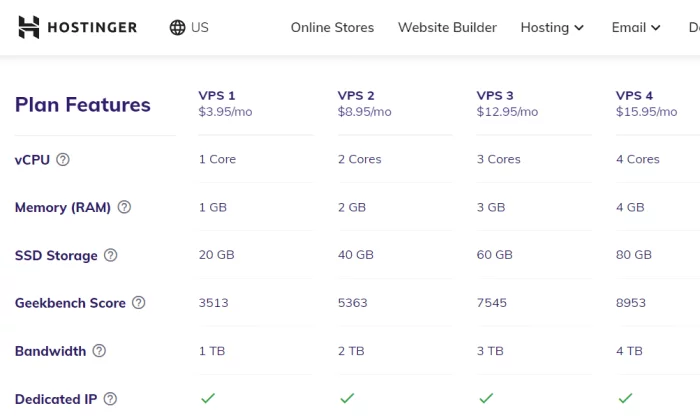
Start off small and scale as big as you want. VPS 1 is an excellent price for getting your feet wet, and comes with more than enough resources for your first project. If you have to upgrade, you have options that remain extremely affordable.
To get the lowest price, you’ll have to sign up for a 4-year deal. This might be a turn off if you are just looking to experiment, but it’s pretty great to be able to lock in 48 months of VPS hosting at $3.95.
And if you just want to pay month to month, the price of VPS 1 is only $9.99. That is really reasonable. Honestly, that is a normal price for shared hosting, and this is way more powerful.
The last thing you need to know about Hostinger is the 30-day money back guarantee. It’s zero risk to try and easy to start using. If you’ve ever thought of seeing how VPS hosting could give you a leg up on the competition, give Hostinger a shot today.
#2 – Bluehost — The Best For New Sites that Need Top Performance

If you have a new app, project, or website that needs it’s own dedicated set of server resources, Bluehost has you covered.
You can get a VPS set up for a great price, without adding a ton of complexity to your IT maintenance.
Everything is easier to configure with Bluehost’s enhanced cPanel, which comes free with all VPS plans. You’ll be able to manage emails, domains, websites, and more within the user-friendly interface.
Usually you have to pay extra for even a basic control panel. Not with Bluehost, though, which starts at $18.99 per month.
And Bluehost includes a lot of services in every VPS hosting package. This means less to spend and try and figure out on your own. You’ll get:
- Free domain name (for the first year)
- Free SSL certificate
- 24/7 Customer support
- Multiple FTP accounts
- Multi-Server management
- Role based access control
You’ll be able to manage all of your sites from a single location with multi-server management. This is helpful if you have sites that are fine on shared hosting and only need the VPS for a particular site or application.
Bluehost offers three different plans for VPS hosting.

The Standard plan is on the low-end of pricing, especially when you consider that cPanel is included for free. This is normally going to cost you $10-15 per month extra.
Bluehost has also improved the control panel with specific tools for managing your VPS.
You can definitely get a cheaper VPS if you are a DIY type who doesn’t want cPanel taking away from their VPS resources. But for your typical user that just wants a simple interface to manage their VPS, Bluehost is a bargain.
Getting the domain name free for the first year is another $10-15 saved.If you are thinking about VPS hosting for a new site or app, you should definitely consider Bluehost.
#3 – HostGator — The Lowest Cost for Managed VPS Hosting

For many people, HostGator is going to be the cheapest way possible to get a managed VPS plan–that means high-power servers with low-stress maintenance for a great price.
In fact, the only reason I can’t say this is the cheapest managed VPS plan for everyone is that you have to use cPanel for server management. If you use something else, HostGator can’t provide the full-service management that makes this option so attractive.
It’s a little unusual, the fact that the hosting control panel impacts the level of service you get. But given that cPanel is one of the most widely used options on the planet, many users are going to be able to benefit from HostGator’s excellent managed VPS plans.
Why am I such a big fan?
First off, the generous amount of resources you get. The entry-level HostGator VPS plan comes with 2 GB RAM, 120 GB storage, and unmetered bandwidth. That means you won’t get charged based on a set level of traffic coming to your site.
Obviously there’s an acceptable use policy, but you don’t have hard fast limits.
You’ll have root access and total control over what you install on your VPS. The Softaculous script installer (included free) lets you load hundreds of the most popular web apps onto your server in a single step.
Whenever you run into trouble, day or night, you can reach out to HostGator by phone, chat, or Twitter, if you really want to catch HostGator’s attention. Premium support comes with every managed plan, as well as server monitoring and remediation.
You can definitely find unmanaged plans for cheaper, but having a service team there around the clock to troubleshoot issues is a tremendous value.
HostGator’s support really goes to the next level with free content transfers. Sign up and HostGator will transfer everything from your old site to its new home–files, databases, scripts–you don’t have to stress or worry.
With HostGator, everything is set up right the first time and you have all the help you need moving forward. HostGator provides courtesy weekly backups, which is helpful, but you can also schedule your own backups and create them on-demand.
Such flexible backup capabilities can easily run $10-20 per month if you purchase them separately (to say nothing of the time it takes). Affordable hosting plans usually cut corners, but HostGator is loaded with cost-saving features:
- Unlimited email
- 2 dedicated IPs
- Unmetered bandwidth
- Softaculous script installer
- Free SSL certificates
- DDoS protection
You have the option of going with a semi-managed plan or a fully-managed plan. The prices you see below are the semi-managed plan:
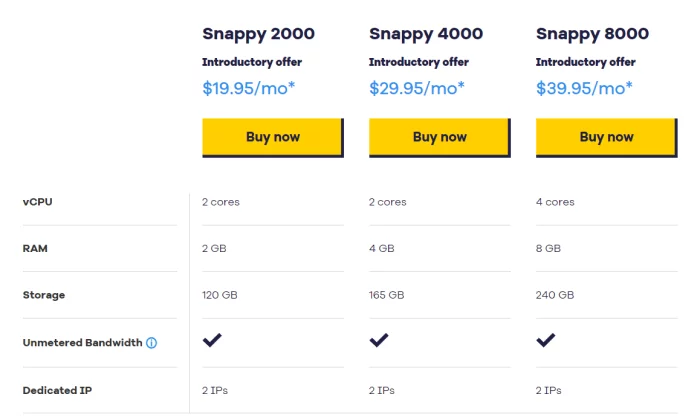
For people who know their way around the command line, or already have a hosting control panel they like, these semi-managed plans will be great. But if you want the fully-managed services, you will have to purchase cPanel, which is $10 per month more.
It’s still a great price, especially when you think about the 24/7 premium service and all the backups and security responsibilities that are taken off your plate.
CentOS is the default operating system, so there is a little less flexibility than some of the other web hosts on my list. That said, for most people, this is going to be fine.
So there are a few limits and asterisks to this deal (you have to use cPanel, for instance), but they are not going to get in the way of most people seeking a managed VPS plan.
Give HostGator a call today and have your site migrated for free.
#4 – Liquid Web — The Best for Upgrading From Shared Hosting

Liquid Web doesn’t offer shared hosting, and if you want to leave that world behind, the company has a great deal to get set up.
Go with one of the managed VPS plans, and Liquid Web throws in a free migration. This involves a team of specialists moving all of your content and data over to the new hosting. I think that’s a pretty big deal because it saves you money, time, and the cost of screwing something up.
And once you get set up, you kind of get to keep the good parts of the shared hosting experience without the downsides.
VPS with Liquid Web is still really affordable, especially when you consider what a dedicated server costs. So you are not breaking the bank to get the increased VPS performance and stability you need.
Plus you get to keep a relatively low-key maintenance schedule, which is something people really love about shared hosting. There’s more to do with VPS, for sure, but much of the backend legwork is handled by Liquid Web if you want.
If you are happy managing your server, get an unmanaged plan. If you want to avoid all responsibility, get a fully managed plan. And if you fall somewhere in between, you can check out the Core VPS plan, which Liquid Web describes as semi-managed.
Just pick the level of support that matches your technical confidence and time constraints.
Bear in mind that the support level you choose for your plan is an additional level of premium support on top of Liquid Web’s customer service team. No matter what plan you pick you can connect with an on-site service agent by phone, chat, and email 24/7.
So you have more freedom to build, better resources to do it, and support whenever you run into issues. It’s an all-around improvement from shared hosting, complete with:
- Integrated firewall
- Remote backups by default
- DDoS prevention
- Proactive monitoring
- ServerSecure protection
You won’t have to worry about managing any of this. It just happens in the background while you focus on your business.
Liquid Web offers a range of plans and bundles with extremely low introductory pricing. Upon renewal, it goes up to the monthly rate.
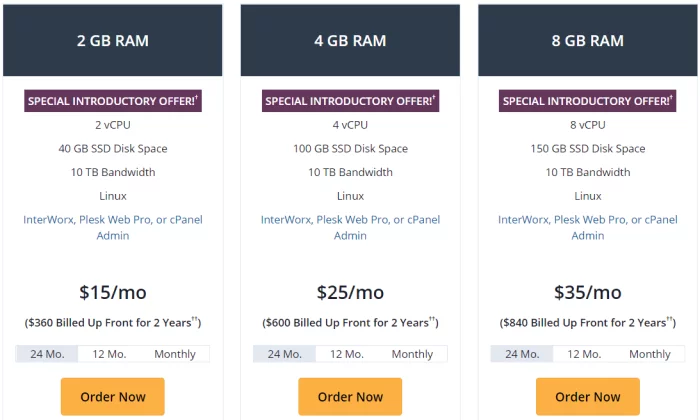
To get the lowest price, you have to sign up for a 2-year deal. I think it’s definitely worth it, although it’s a higher upfront cost. You just save so much money by doing this. Looking at the 2GB packages, it’s normally $59 per month and worth every penny.
I mean look at the bandwidth. 10 TB is far and away the most you will see with an entry-level plan. Getting that for $15 a month is an outrageous monster-step up from shared hosting at basically the same price.
You can also go with a Value Bundle, which is available for any plan. This gives you business email service, and additional 100 GB of remote backup, and additional security benefits.
You have your choice of six different operating systems, including Windows Server.
I recommend going with CentOS, if you can, because then you can use Interworx as your control panel for free. If you want to use something else, you’ll need to get cPanel or Plesk, which is included as an extra charge.
So if you are looking at VPS as a way to boost the performance you’re getting with shared hosting, Liquid Web is a really good option. You’ll get the blazing speed you need without a ton of additional maintenance headaches associated with private servers.
And remember, Liquid Web will bring everything over from your old host for free. This is the easiest and most affordable way to get your online assets the dedicated server resources they deserve.
If you pay monthly and use coupon code NEIL40, you can get 40% off your first four months. Get started with Liquid Web today.
#5 – Scala Hosting — The Best VPS Hosting for Scaling on the Fly for Free
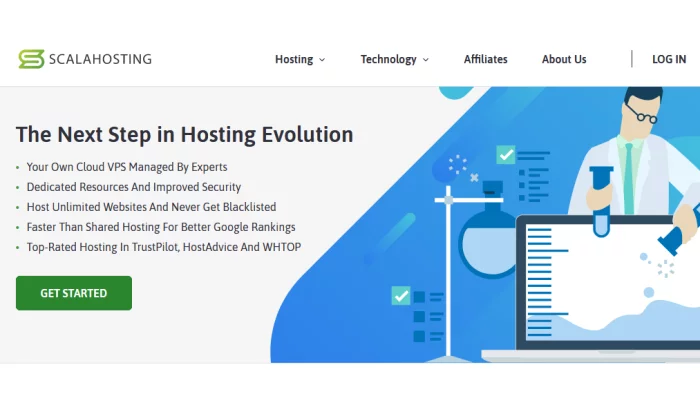
VPS hosting is the most powerful game in town outside of having your own dedicated servers. Chances are, you’re looking for VPS because you know (or at least hope) that your site is going to need a lot of CPU cores, RAM, and/or storage to give visitors a good experience.
But you may not know exactly what you need from server resources until you’re live. Fortunately, Scala Hosting gives you tremendous flexibility in every way.
It begins from setup—Scala lets you choose between fully-managed and self-managed VPS, each of which allow you to finely customize the CPUs, memory, and SSD disk space you’re getting.
And by finely, I mean finely. Just look at the range of resources available to you on both:
Self-managed VPS:
- CPU cores: as few as two CPU cores, maximum of 24
- RAM: as little as 8 GB, maximum of 64 GB
- SSD storage: minimum 80 GB, maximum 2 TB
- Can add additional CPU cores ($4 each), RAM ($1.50/GB), and disk space ($1/10 GB) beyond maximum
- Select your preferred operating system
Fully managed VPS:
- CPU cores: as few as one CPU core, maximum of 24
- RAM: as little as 2 GB, maximum of 128 GB
- SSD storage: minimum 20 GB, maximum 2 TB
But, better still, your resource allocation choices are not carved into stone. You can scale up or down your number of CPU cores and how much RAM you need (you’re only able to upgrade SSD storage, though, not downscale). And you won’t be charged for doing so at any point in your plan.
So, if you find you miscalculated on your initial plan setup—or, better still, your site is more popular than you bargained for—no sweat. You’re able to tweak your VPS plan anytime, so you’re only paying for what you need while also not missing out when you need more.
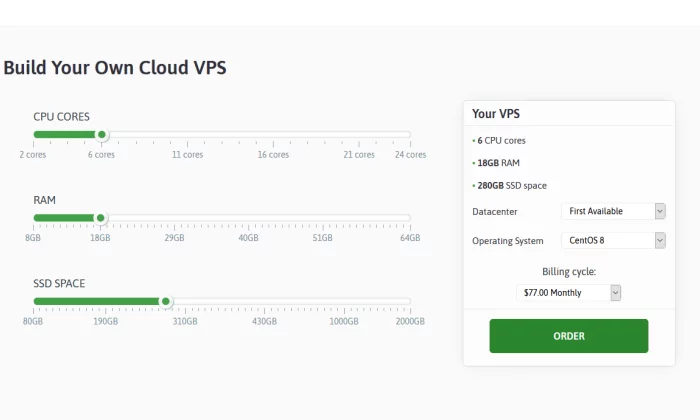
As far as pricing goes, the self-managed VPS from Scala starts at $26/month for the bare minimum (two cores, 8 GB RAM, 80 GB SSD). The prices above in the bullet list for adding CPUs, RAM, and disk space apply throughout.
So, a plan comparable to Bluehost’s top-of-the-line VPS (four cores, 8 GB RAM, 120 GB storage) runs you just $38/month, better than Bluehost’s $59.99/month.
Scala’s fully managed VPS is, understandably, pricier, but allows for lower monthly cost by committing to longer terms, up to a three-year commitment.
The steps up are more expensive—$6 per additional core, $2 for each additional GB of RAM, $2 for each additional 10 GB of storage—but, again, you aren’t charged just for the act of adjusting resources and you’re still coming out ahead compared to some other higher-end managed VPS plans.
Compared to GreenGeeks’ 8 GB plan (6 CPUs and 160 GB SSD), Scala comes in cheaper on month-to-month pricing ($87.95/month), as well as any longer commitments.
So, with Scala Hosting VPS, you get exactly what you need from their servers, both when initially setting up your web hosting and throughout the life of your commitment with them. That’s true freedom, flexibility, and customization.
Get started with Scala Hosting today.
#6 – GreenGeeks — The Best Off-the-Shelf Managed VPS Hosting

GreenGeeks offers a complete package of managed VPS hosting services. You aren’t spending extra to fill in the cracks or get the setup you want.
It’s ready to go out of the box, and perfect for the buyer who wants the performance of VPS without the IT headaches that come with.
Top-notch customer support is included with the package deal. GreenGeeks admins will help with everything from sluggish sites to network problems. Basically, they will help you with anything except the apps and websites you build yourself.
The price for GreenGeeks is definitely a little higher than some of the others you’ll see, but you’re not spending extra to purchase stuff like “premium support” or licenses for cPanel. That’s all lumped into the monthly price.
You are able to get all of your sites and apps deployed without opening your wallet up again and again.
There are no upsells on the platform. Those don’t bother me a lot, but some people really don’t like paying for a service only to be shown more products to buy at every turn. GreenGeeks will even transfer your website for free as long as you are using cPanel.
Another reason I like this option is the high bandwidth limits. You get an astonishing 10 TB with GreenGeeks entry-level VPS hosting plans. 10 terabytes? For real? Yes.
So if you are expecting boatloads of traffic, GreenGeeks gives you the bandwidth not to worry. Most other hosts aren’t giving you 10 TB unless you are paying significantly more. Some of the other standout features of GreenGeeks include:
- cPanel/WHM included,
- Free cPanel migrations,
- Free SSL certificate
- 24/7 server monitoring
- Custom security rules
- DDoS protection
- 300% renewable energy infrastructure
If you were wondering about the name GreenGeeks, yes, the company is very much concerned with the environment. For every bit of energy you pull from the power grid to run the hosting of your site, GreenGeeks puts three times that amount back into renewables.
This is the only eco-friendly host I know of. If that’s important to you, know that you are making a positive impact by choosing GreenGeeks as your host.
And even if environmental concerns aren’t something at the forefront of your mind, GreenGeeks is just a great VPS hosting provider. Yes, it’s a little pricier than some, but it is hardly expensive when you look at what you get.
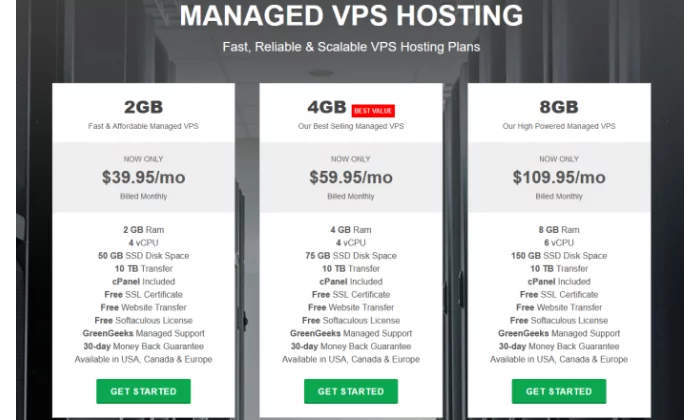
I really like GreenGeeks for users who want an all-in-one VPS hosting solution. All of the key aspects are covered.
There’s no catches, asterisks, or fine print to figure out. Just pick your plan and start building.
On top of that, you get comprehensive, truly managed support. GreenGeeks is there to help with any hosting issue. There’s no red tape separating you from the service you need, whenever you need it.
For the socially-conscious company, GreenGeeks should be your first choice. But like I said, even if you don’t worry so much about the environment, choose GreenGeeks for the solid price on resources for your VPS. Getting 10 TB bandwidth and 4 CPU cores is remarkable for an entry-level plan.
If you are looking for a VPS hosting solution that works out of the box, GreenGeeks should be on your shortlist. Get in touch with them today.
#7 – InMotion — The Best for Hosting Multiple WordPress Sites

InMotion is a phenomenal hosting company that’s beloved by power users and first timers.
You’ll find that they offer the full range of VPS services. Get a small slice of a server that’s completely yours for a cheap price, opt for a managed hosting plan with hands-off maintenance, or get a reseller plan built for your bottom line.
What I want to focus on in this review is InMotion’s WordPress VPS hosting. This is a great solution for companies that have a lot of high-powered WordPress sites.
Once you reach a certain point, shared hosting is not going to be enough to keep your sites fast. Some companies choose managed WordPress hosting, but that can get expensive. Plus you lose a lot of the control over how the server is configured with those plans.
With InMotion’s WordPress VPS, you get to set up your server any way you want, but you still get a lot of the benefits of a managed WordPress hosting plan: an exclusive WordPress hosting environment, top-of-the-line performance, built-in security, on-demand and automatic backups, and more.
And it’s likely going to be a lot less expensive than a traditional managed WordPress hosting plan for a lot more resources.
Another way to think about it is that you get the performance you need for your sites without the loss of customizability.
To make the transition to InMotion easier, the company offers Launch Assist. This is two hours with an IT specialist to help you set everything up right the first time. Avoid costly downtime, frustration, and mistakes down the road.
As I noted, you’re going to get a lot more resources than you could get with a managed WordPress plan, but it’s not like you are on the hook for a ton of maintenance. It’s a nice balance.
All of the tools you need are included. You get:
- cPanel/WHM
- Ecommerce optimization
- Snapshot backups
- Free SSL certificate
- Malware and hack protection
- Free domain name
- 3 dedicated IPs
A lot of VPS plans you’ll see come with a single dedicated IP. With InMotion, you get at least three, which is helpful if you have a lot of WordPress sites, or want to keep them separate from mail servers and other projects.
And if you need more resources, scaling up remains very cost-effective.
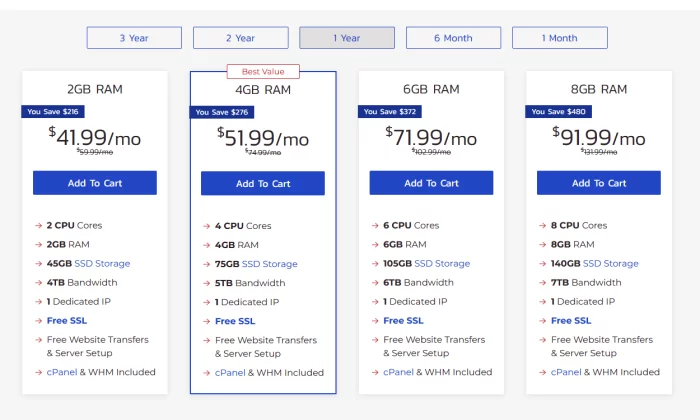
With some plans, you have to pay $10+ per month just to get a cPanel account. InMotion gives you five with the entry-level plan. You’ll also have a Resource Monitoring Dashboard that gives you performance metrics at a glance.
To get the lowest price, you’ll have to sign up for two years, but InMotion offers 1-year, 6-month, and monthly plans as well.
One of the reasons I like InMotion so much for WordPress VPS is the security. WordPress is the most popular content management system in the world, and a favorite target of hackers. InMotion gives you a free SSL certificate, as well as protection from malware, hacks, and DDoS attacks.
It’s just a great option for people whose needs to fit neatly into a managed WordPress hosting plan. If you want top-tier performance without sacrificing control, InMotion WordPress VPS is a really great choice.
#8 – GoDaddy — The Best for Spending as Little as Possible
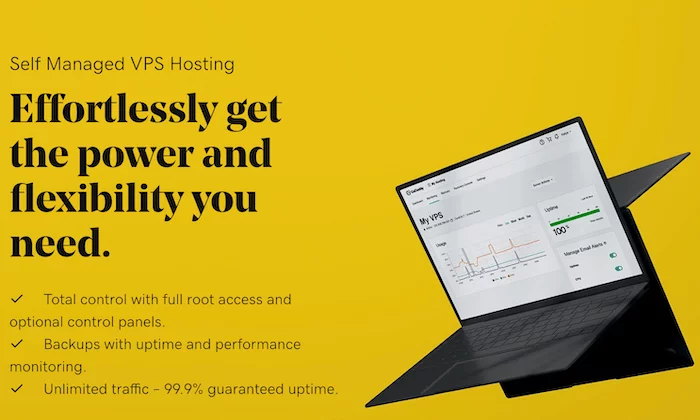
GoDaddy is one of, if not the most, recognizable player in the hosting space. It can be a great option for people looking for an unmanaged VPS plan with no-frills.
Now GoDaddy does offer managed VPS plans that take a ton of the server maintenance and monitoring off your plate. But it’s really expensive, especially looking at some of the other managed VPS plans I’ve reviewed. It wouldn’t be my recommendation.
But if you are in the market for a DIY hosting plan that gives you total control along with the exact resources you need, GoDaddy VPS plans are a great place to start.
You can get three years of GoDaddy VPS for under $180. It’s a barebones plan targeted at users who know what they are doing. So you won’t get a ton of tools to help you stay organized or white-glove support, and there are going to be upsells at every turn.
But if you are comfortable managing your own server, why pay for things you don’t need?
You also get more flexibility to choose your resources. GoDaddy offers both Standard and High-RAM plans, which give you double the memory. Most other providers don’t give you that option.
Usually you are stuck jumping from one plan to the next, but GoDaddy will let you increase RAM, which may be all you need to get your sites loading faster.
Another helpful bit of flexibility is GoDaddy’s month to month pricing. VPS hosting starts at $7.99 per month with no contracts or commitments. This is an insanely low price for your own private resources.
And there’s quite a bit included with the low price of VPS hosting. It’s not as complete a package as GreenGeeks by any means, but GoDaddy doesn’t cut corners on the fundamentals. Some of the features included are:
- Free SSL certificate (for one year)
- Automated, weekly, and snapshot backups
- Performance monitoring
- PCI compliance
- Phone support
If you are the DIY type, this is more than enough support and assistance to keep your site running smoothly. And when you think about paying $4.99 per month to get started, you can see why GoDaddy is so popular.
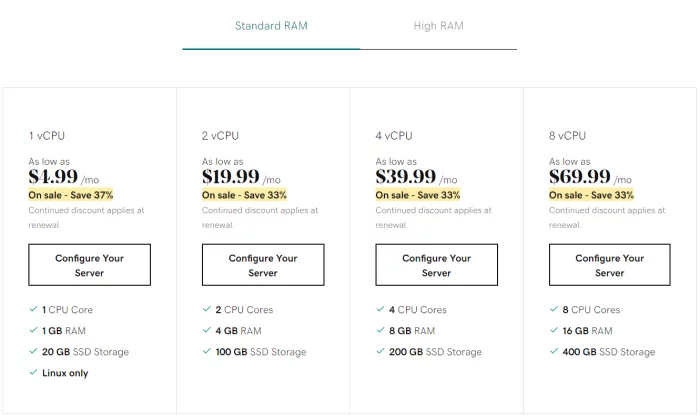
There’s really no way to spend less and get VPS hosting from a reputable provider. The pricing above is for Standard RAM plans.
If you opt for High RAM, the lowest plan becomes $9.99, but you get two GB of RAM instead of one. Basically, you double your RAM for any plan and pay a slightly higher price.
The storage limits on the entry-level plan are on the low end compared to some of the others I’ve reviewed. If that’s a concern, you might want to look at another plan, though it’s still fairly affordable to upgrade with GoDaddy and get a ton more resources.
For someone who knows their way around a server, GoDaddy VPS is the cheapest option. If you just want to be left to your own devices, this is a great option. Reach out to GoDaddy today and see what kind of a deal you can get.
#9 – Media Temple — The Best VPS Hosting if You Manage Sites for Clients
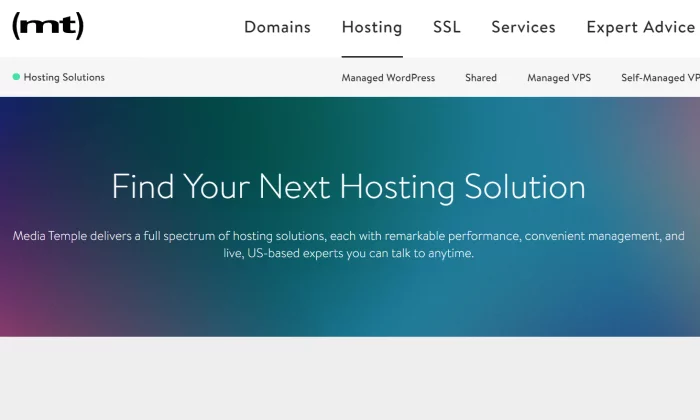
Media Temple is a great choice for companies that need VPS to support their clients sites and projects. This is true whether you want to worry about the technical backend yourself, or if you’d rather let MT handle the day-to-day maintenance.
If your team is totally comfortable with all the IT responsibilities, the DV Developer plan is packed with power at the low starting price of $30 per month.
You can pick from multiple versions of Debian, Ubuntu, or CentOS. Manage everything through SSH and build as you see fit. It’s complete flexibility, scalability and freedom for people that are at home in the command line.
For companies that want it, the DV Managed plan provides your choice of control panel for easy server management, as well as world-class support from IT experts. Chat, tweet, call, or request support any time of day. You get 99.99% uptime guaranteed, with money-back if Media Temple doesn’t live up to it.
In fact, you get 20% of your monthly hosting cost back in your pocket for every 20 minutes of downtime that month.
The managed plan is not quite as flexible as the developer plan. You get multiple options for which control panel you want to use, but CentOS is the only operating system supported.
But there’s a lot less work to be done. You won’t have to worry about updates or security patches to keep your VPS safe. You can use cPanel/WHM or Plesk, and know that the control panel is always going to be working.
This is a big deal for resellers and agencies that have to manage their client’s sites. The control panels are always working properly, and whenever there is an issue you can’t figure out, Media Temple is there to help.
For companies that want to outsource more of their IT and security responsibilities, Media Temple offers an Agency Bundle. This includes advanced support, a technical account manager, and a suite of security services you can deploy to multiple sites.
The all-in-one bundle makes it easier than ever to outfit your clients with secure, high-speed sites in very little time.
You choose what level of support makes sense, and Media Temple ensures your hosting foundation is secure for business.
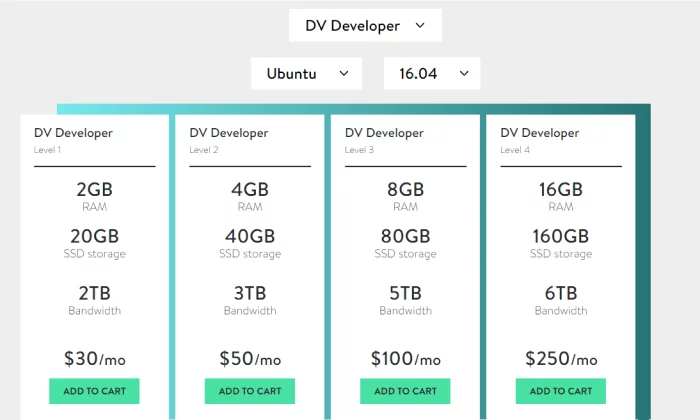
For developers who just need access to world-class resources, plans start at $30 per month.
The 2 TB bandwidth is quite good for the Level-1 Developer plan. One thing to keep in mind is that Media Temple includes 24/7 support with the developer plans. Some unmanaged plans from other hosts really skimp on support, but Media Temple does not.
The DV Managed plans have a similar price breakdown to the developer plans. A Level-1 Managed plan starts at $55 per month. You get more storage and everything you need to use your VPS comes pre-installed.
The Agency Bundle starts at $250 per month. The suite of hosting and security services costs far less than if you were to purchase the parts individually. It also works a lot better, because it’s been configured by Media Temple ahead of time, rather than cobbled together from a slew of third-party services.
Media Temple provides a turnkey solution that gives you the resources you need. For resellers, the peace of mind of having top-quality performance and support is a non-starter. Troubles will compound quickly when there are issues. But with Media Temple, there won’t be.
Go with Media Temple. Your clients will thank you.
#10 – InterServer — The Best Deal If You Want Total Control
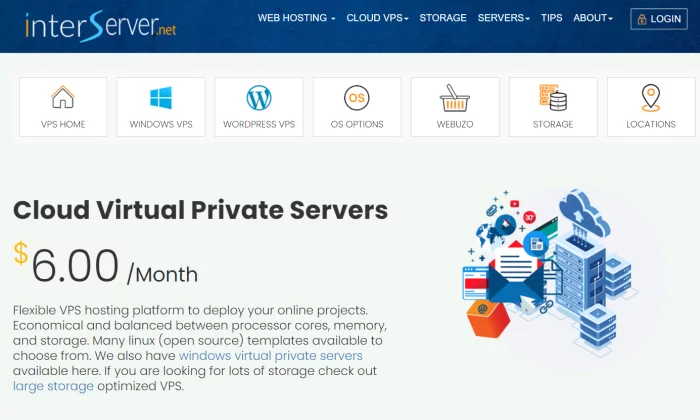
InterServer has some of the best prices in the VPS hosting space.
Part of the reason is that they slice up servers into 16 different packages. You can really hone in on the exact set of resources you need. It’s simple: choose between one and 16 CPU cores that come with an increasing amount of memory, storage, and bandwidth.
What’s really nice is that fully-managed support comes free as long as you purchase four or more slices. That’s what InterServer calls each tier, and you can add slices at any time.
You get a lot of hosting resources for every dollar you spend. It’s not hard to find comparably-priced VPS plans with a fraction of the memory or storage you get with InterServer.
For the buyer that doesn’t need managed support, the value is unbeatable. Yes, the $6 per month cost is slightly higher than GoDaddy, but InterServer’s VPS is a lot less barebones.
First off, you get the DirectAdmin control panel for free. It makes it easier to configure your server and set mail accounts. You can add cPanel or Plesk for an additional price, but only if you need them.
With GoDaddy any sort of control panel will be an extra cost.
InterServer is extremely reliable. They offer a 99.99% uptime guarantee. The company actually uses an artificial intelligence system to scan their network for potential performance issues. Instead of your site taking a hit, the AI detects and solves the problem far faster than any human response.
The value is really there. As I’ve said, you get very high resource limits at a low price.
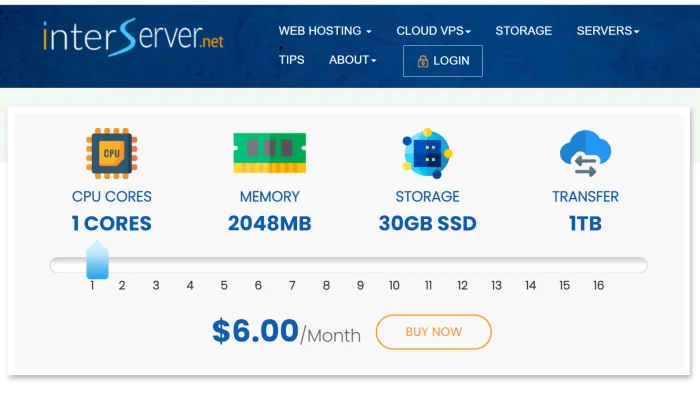
The starting price for a single CPU core is $6 per month. You also get more than 1 GB memory, 30 GB storage, and 1 TB bandwidth. That’s 10GB more storage than GoDaddy for a dollar more each month.
You can add slices for $6 at any time. This boosts all of your resources across the board. I like this arrangement a lot, because it’s so flexible. Instead of being catapulted into a much higher pricing package, you can grow incrementally.
And remember, at 4 slices and higher, InterServer throws in fully-managed service for free. This should put InterServer on the map for the non-DIY crowd as well.
InterServer offers Windows VPS hosting starting at the low cost of $10 per month. The pricing arrangement works the same–you can purchase anywhere from one to 16 slices in $10 increments.
You can also get WordPress VPS hosting through InterServer. InMotion is my top choice for WordPress VPS hosting for most users because it includes cPanel/WHM. If you don’t need that, or have a fairly small WordPress site, InterServer may be more cost-effective.
For advanced users, InterServer is going to give you a great deal on whatever selection of resources you are after. The free control panel is a huge standout, which is going to make simple tasks easier.
Get in touch with InterServer today to secure a great price on a VPS hosting plan that meets your exact needs.
#11 – iDrive Compute — The Best for Supporting Networks of Smart Devices
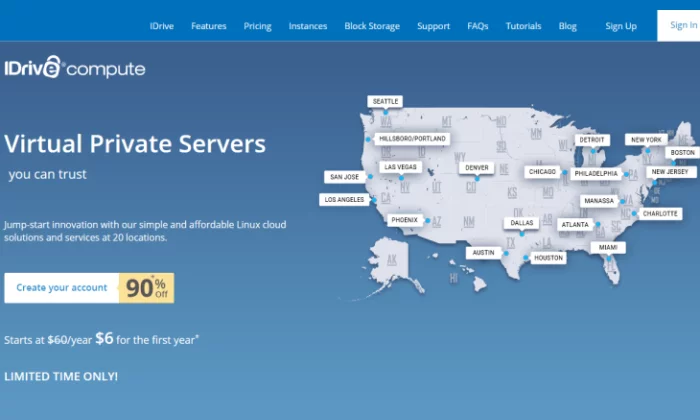
The future is likely to be dominated by smart devices. Believe me, between personal devices like health monitors and smart watches all the way up to fully autonomous vehicles, factories, and production lines, handling all of that data is going to crush many current tech infrastructures.
I love iDrive Compute for that reason. They make it easy and accessible for any organization to wield the power of edge computing so that you can manage, monitor, and collect from devices anywhere in the world.
They rightfully boast of their 4,000 servers spread across every continent. Their 20 U.S. data centers alone make it easy for an American company to, for example, troubleshoot a faulty pallet loader in Spokane, adjust smart thermostats in several storage centers across the Midwest, and collect data from wireless inventory trackers in facilities all along the east coast.
With iDrive Compute’s VPS for edge computing, you can stay on top of all of that without fretting about low latency, poor syncing, unreliable connections, or security vulnerabilities.
That’s just one practical example of what edge computing is useful for.
You can leverage iDrive Compute for online gaming, streaming video delivery, running cloud-based applications, big data processing, or even patient monitoring.
Whether you’re a startup looking to get into a cutting-edge field or a mature, enterprise grade operation that has massive demands for data transferring and processing worldwide, you get a great service at a great price from iDrive Compute.
Plus, they’re offering 90% off your first year, whether you choose a shared package or one that is CPU or RAM-optimized.
Resources scale up to 32 CPU cores, 64 GB RAM, 1280 GB of NVMe storage, and 12 TB of data transfer on the shared track. For the optimized, dedicated plans, you’ll max out at eight CPU cores with varying ceilings for the other resources.
With that 90% off, you can get a year of the most basic shared VPS from iDrive Compute for just $6! Even the most elaborate packages won’t run you more than $390 for your first year. That’s a great way to get started and see what edge computing can do for your business.
Get with iDrive Compute today and start using edge computing for your needs.
What I Looked at to Find the Best VPS Hosting Plan
VPS web hosting occupies something of a middle ground between shared hosting and getting a dedicated server for yourself.
Some people have outgrown shared hosting. They need server resources that aren’t impacted by other sites on the server. VPS hosting offers a much more stable, scalable solution.
Others need an email server or a space to develop apps. VPS hosting lets them buy exactly what they need to build and access their assets whenever they want, wherever they are.
For people hosting ecommerce sites and other resource-intensive applications, a VPS gives them all the server firepower they need. Adding more resources is easy, weathering traffic spikes is no issue, and they can configure the server as they see fit.
And VPS is way cheaper than dedicated hosting. $1,000 per month is completely acceptable in that space, usually it’s more.
A lot of companies will get there eventually, but a dedicated server is complete overkill where they are today.
VPS gives you your own slice of dedicated resources. Scale as need be.
The providers I reviewed have excellent speed and uptime. If you go with one of these VPS hosting plans, your sites will be up and they will be fast.
But you can’t just pick a vendor with a good reputation. I’ve gotten you to the right dealership. You need to pick the right ride.
When it comes to VPS hosting, there are sports cars and work trucks. Both are fantastic machines, but only for the right company. The moving crew may have fun in the Mustang, but it’s terrible for getting sofas from A to B.
By understanding your way around VPS hosting, you can select a setup that takes care of what you need at the right price. Here’s how to find your way.
Enough Resources Not to Worry
Each host clearly lays out the exact resources you get. These are the guts of the computer that you are paying to use, and they will impact every aspect of performance on your site. Here’s what you are looking at:
- Storage
- Memory
- CPU
- Bandwidth
I would want to have a clear idea of what I plan on using in each of these resource categories before starting my search. If you are unsure, ask your current host where to find stats on your usage.
For people thinking about VPS for a new project, reach out and talk with the sales team at a host which checks your other boxes. They will be more than happy to help you determine a resource amount that makes sense. And even if you don’t go with them, now you know.
You’re trying to find something that gives you more than you need. Even though these are your dedicated resources, maxxing them out all the time can lead to issues with your host.
Looking at the different vendors, you’ll see a lot of jargon about different resource types. They do matter, but I will say that most top quality VPS hosts use the best technology available.
That said, some web hosts have specific plans geared toward people who need more of a certain resource. GoDaddy has High RAM plans for people who need more memory, for example, and InterServer offers Storage Optimized VPS plans that come with an insane amount of disk space at a low price.
If you’re trying to make a decision between two different vendors offering the same package of resources, I’d sign up for a free trial of both and see which gives you the better performance.
Since it’s not always feasible to really test hosting limits during a trial period, I’d focus on going with a vendor that will still make sense economically if you have to upgrade to a more expensive plan than you thought.
This train of thought also applies well to VPS for edge computing use cases. The spread of resources from the cheapest plans to the most expensive are awfully similar. Make sure you get at least enough for what you currently need, whether that’s to accommodate a lot of users, devices/virtual machines, or data.
One thing you might have to additionally decide on, in this case, is whether you want to optimize for processing power or memory. The former is better for handling CPU-intensive applications, like dynamic or streaming content delivery, gaming, or machine learning. The latter is a boon for intense computation and and big data analysis.
Make sure you can scale in this situation, too. The growth potential that VPS edge computing unlocks means you might find yourself needing more sooner than you think.
There’s more to this decision than simply looking at the nuts and bolts, so let’s move on to other factors that can help you decide between similar offerings.
Total Control vs. Shared Responsibility
Some people choose VPS hosting because they are excited to control every aspect of the server.
Others are looking for predictable, high-power performance, but they’re less jazzed about the IT responsibilities of managing their own virtual machine.
Where do you fall in this spectrum?
There’s basic server maintenance, patching, and updates that need to happen. Otherwise your VPS may get hacked and wind up powering some crypto-mining scheme on the other side of the world. And that’s a benign example of what could happen if your site is compromised due to a server management oversight.
If you’re a first-timer who wants a helping hand setting things up, or you don’t want the hassle of dealing with the IT backend, I recommend finding a managed VPS plan.
With this arrangement, your hosting provider takes over much of the basic, day-to-day, IT maintenance that goes into keeping a server healthy and secure. This leaves you to enjoy the faster hosting and focus more on your business.
The experience of managed hosting is geared towards people that are less familiar with making changes on a server using the command line. With a managed VPS plan, you’ll get a visual control panel that allows you to configure everything with clicks instead of a computer language.
People with a lot of development know-how don’t need the extra hand-holding or tools that simplify server management. In fact, those things might just get in the way.
If you fall in this crowd, I recommend an unmanaged VPS hosting plan. You basically just get the server resources and manage everything yourself. You’ll still have some helpful tools and in some cases a control panel, but for the most part you are entirely responsible for the security and configuration.
The biggest plus for developers is total control–do whatever you want, however you want. It’s also way less expensive. GoDaddy, for example, offers unmanaged plans starting at around $5 per month. The same server resources on a managed plan from GoDaddy start at about 20-times that price.
Not every web host has such a stark pricing difference, but it’s usually significant. And it makes sense. With self-managed plans, you are on the hook for a lot more IT legwork. If that’s not a drama, then don’t pay for it.
If you are on the fence about what you need, I suggest going with a managed VPS plan. Better to pay a little more than have your new hosting account compromised because of some basic technical slipup.
This isn’t a concern for those of you looking to get into VPS for edge computing or IoT device wrangling. Most options out there right now are fully-managed, thankfully. The providers are the ones offering their data centers to you, so it’s only right that they should be responsible for maintenance and upkeep.
No Issues Running Your Sites or Apps
Are you planning on running anything on your VPS that has unusual requirements?
If you don’t know the answer to that question, you’re probably fine, but it doesn’t hurt to double-check that the operating system (OS) you plan on using is supported by the host you choose.
This is especially true for managed VPS plans, because the OS often comes pre-installed. With unmanaged plans, you just have to make sure the one you want is available for install. There’s usually a pretty wide range of choices, but not always.
Even more so, this is crucial for edge computing. If you’re running virtual machines on your VPS servers or incorporating a wide array of smart devices, compatibility with the infrastructure you sign up for is of paramount importance.
Most VPS hosting is Linux-based, and works seamlessly with basically everything on the internet. There are different Linux distributions, like Ubuntu, Debian, CentOS, but in general they will all work for most users.
The major exception is Windows hosting. There are certain Microsoft apps and services that can’t run on Linux, like SharePoint, Exchange and MSSQL databases.
Many hosts don’t offer Windows hosting. I’ve called out the ones that do in the reviews.
One important thing: You can have a Windows PC and use Linux hosting. That doesn’t matter at all. Windows hosting is only necessary if you need to run specific Microsoft products on your VPS.
Timely and Tech-Savvy Support
If this is your first time using VPS hosting, I’d be very conscious of how much assistance you’re going to get. Even if you opt for a managed VPS plan, there’s still a few steps you have to take to ensure that your new hosting set up is secure and running as intended.
I would strongly recommend customer service that provides free migrations or data transfers, like Liquid Web or HostGator. Having them help you set everything up right will be quicker and easier, there’s just nothing else to be said.
If you’re moving over from shared hosting, know that the range of technical issues is much greater. You are going to need a tech that really understands what’s going on.
This is only more true for self-managed plans where you may have configured your server in a very unique way. Troubleshooting your issues will likely require a high-level of knowledge and understanding.
Every vendor that made my list for best VPS hosting has some form of round-the-clock support. Where you will find differences is in the number of channels you can reach out on. Some will offer live chat only whereas others will have phone, email, or ticketing systems as well.
As you are gathering a sense of the customer service quality you are likely to get, I encourage you to read online reviews. Take them with a grain of salt, however, because any long-standing, popular host is going to have one-star reviews from their millions of users.
The best thing you can do is reach out to the company as much possible before, during, and after you sign up. Submit lots of tickets and clock the response. Use the online knowledge base to solve problems on your own. Is the content actually helping you?
Most of the plans I’ve reviewed offer free trial periods. Sign up and test the support staff. This is your relatively risk-free way of getting an actual read on the service quality.
In general, premium customer support costs extra. This is how you get immediate call backs and additional service channels beyond the basic coverage they provide for all customers.
If you think that you need frequent guidance, I suggest looking into the premium support plans. It’s an extra cost, but saving a few hours of frustration each month is plenty of value.
Summary
If you need top performance and aren’t interested in a dedicated server, then VPS hosting is good option.
Use the buyer’s guide and reviews to work your way to a sensible decision. You’re looking for something that gives you a comfortable level of control and more server resources than you think you’ll need.
Here’s a complete list of my recommendations with links for you to explore further:
- Hostinger — The best VPS hosting for first-timers
- Bluehost — The best for new sites that need top performance
- HostGator — The lowest cost for managed VPS hosting
- Liquid Web — The best for upgrading from shared hosting
- Scala Hosting — The best VPS hosting for scaling on the fly for free
- GreenGeeks — The best off-the-shelf managed VPS hosting
- InMotion — The best for hosting multiple WordPress sites
- GoDaddy — The best for spending as little as possible
- Media Temple — The best VPS hosting if you manage sites for clients
- InterServer — The best deal if you want total control
- iDrive Compute — The best for supporting networks of smart devices
There’s a range of options on here. The managed plans will work well for people who don’t have time to handle the technical stuff. Some of the really affordable plans just give you the server resources and let you build from there.
To find the right one for you, follow the methodology described above. It will help you make sense of all the options available, and find one that has the features and support you need.


